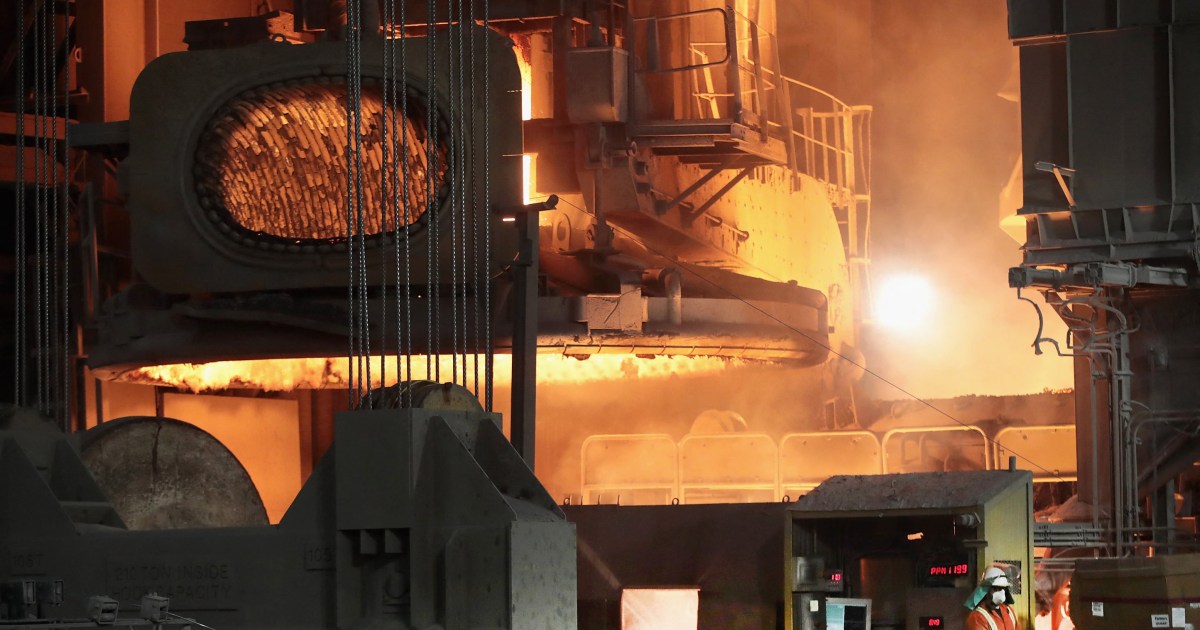In his most recent effort to reshape an international trading order that he claims is unfairly biased against US manufacturers and workers, President Donald Trump has imposed 25% tariffs on all imported steel and aluminum.
Trump claimed that the US industry has been “pummelled by both friend and foe alike” by signing a number of executive orders to impose the tariffs on Monday.
Steel and aluminum are needed in America, not abroad, according to our country. We need to create in order to protect our country’s future”, Trump said as he signed the orders.
“It’s time for our great industries to come back to America. We want them back to America. This is the first of many”.
Trump said the tariffs, which he had floated on Sunday, would apply to all countries with “no exemptions, no exceptions”.
“This is a big deal”, Trump said. “This is the beginning of America’s recovery.”
Trump’s latest tariffs, which are due to take effect on March 4, are all but certain to prompt retaliatory moves from affected countries, which include some of Washington’s closest allies, raising the likelihood of new trade wars on multiple fronts.
According to government data, US imports of steel and aluminum in the region of $ 49 billion in 2024.
Canada was the biggest supplier of steel, followed by Mexico, Brazil, South Korea, Germany and Japan, according to the US International Trade Administration.
Canada was also the largest exporter of aluminium, with other major suppliers including the United Arab Emirates, South Korea and China.
In Canada, Trump’s announcement sparked a nearly immediate backlash.
“Trump wants us to lose our cool. However, we must remain united and choose the best course of action, according to Mark Carney, the Liberal Party’s candidate to succeed Justin Trudeau as leader of the Liberal Party.
“Canada needs to support our crucial steel and aluminum workers by imposing dollar-for-dollar tariffs on them in the short run.”
Trump has indicated that he will also announce reciprocal tariffs on US goods this week, without specifying which nations will be affected.
The US president agreed to suspend imports until March 1 after reaching a temporary deal to improve security on the US border, and Trump also announced a 10% tariff on all Chinese goods that went into effect last week.
Despite Trump and his allies’ claims that the levies will revive domestic manufacturing and boost state finances, economists have warned that Trump’s broad-based tariffs are likely to cause higher prices for the US consumer and set off an escalation of trade disputes that dampen global economic growth.
The Tax Foundation, a think tank based in Washington, DC, has estimated that Trump’s tariffs in 2018 and 2019 led to a 0.2 percent reduction in gross domestic product (GDP).
We estimate the tariffs on Mexico, Canada, and China proposed to go into effect on February 4, 2025, would shrink economic output by 0.4 percent and increase taxes by $1.1 trillion between 2025 and 2034 on a conventional basis, amounting to an average tax increase of more than $800 per US household in 2025.
Michael Stanaitis, a trade expert at the American University in Washington, DC, said the impact of Trump’s tariffs would be “very serious”.
US consumers can anticipate higher prices and production shortages, particularly in sectors like the US auto industry, which frequently uses foreign inputs for domestic production, according to Stanaitis, according to Stanaitis.
We will experience a difficult transition in the global economy as foreign producers try to absorb the excess global supply of steel and aluminum brought on by declining US demand, assuming US producers and consumers are unwilling to pay the tariffs.
During his first administration, Trump previously announced a 25% tariff on steel and a 10% aluminum import.
Trump later that year increased the tariffs to the European Union, Canada, and Mexico after initially exempting a number of US allies and friendly nations.
In 2019, the US president reached agreements with Canada, Mexico, Australia and Argentina to exempt their exports from the tariffs.
Trump said he would take into account excluding Australia from the tariffs despite insisting there would be no exemptions from the tariffs on Monday despite the fact that Australian Prime Minister Anthony Albanese had earlier stated that the parties were envisaging an exemption.
“We have a surplus with Australia, one of the few”, Trump said. “And the reason is they buy a lot of airplanes”.
Stanaitis, the American University professor, said Trump’s latest tariffs would cause “a lot of angst and tension” among the US ‘ trade partners.
Source: Aljazeera

Leave a Reply